
What is kd in ahrefs
If you're diving into SEO, understanding the Ahrefs keyword difficulty score can be a game-changer for your strategy. This guide will walk you through what the score means, how it's calculated, and why it matters for your content planning. Let’s simplify this important tool and help you make informed decisions for your website's growth!
What is KD in Ahrefs?
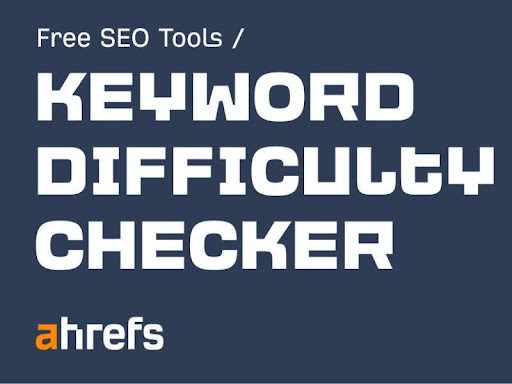
KD in Ahrefs measures keyword difficulty based on competition and backlinks
KD stands for Keyword Difficulty in Ahrefs. It is a metric that evaluates how hard it is to rank a certain term in search engine results. A scale from 0 to 100 represents the KD score, where higher numbers indicate more difficulty.
A higher KD suggests that many strong competitors are already ranking for that keyword, implying that more effort (like high-quality backlinks, content optimization, etc.) will be required to gain a good position. Conversely, a lower KD means less competition, making it easier to rank.
Keyword Difficulty scale
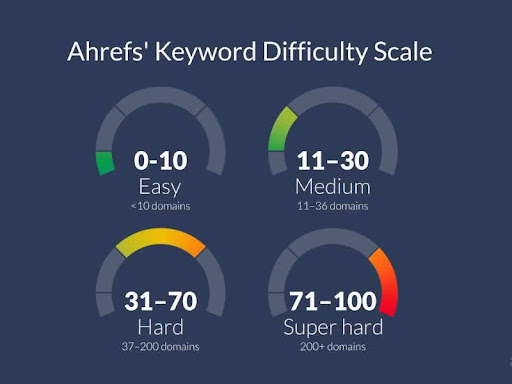
The Keyword Difficulty scale measures how hard it is to rank
Ahrefs uses a keyword difficulty (KD) scale to assist you determine how challenging it will be to rank for a certain keyword. The KD score ranges from 0 to 100, with 0 being the easiest and 100 being the most difficult. A lower score means there’s less competition, and it's easier to rank for that keyword.
Here’s a breakdown of the scale:
0-10 (Low Difficulty): Because there isn't much competition for these keywords, ranking for. They are ideal for starters or low-authority websites.
11-30 (Moderate Difficulty): These keywords are still achievable, but they require more effort. You’ll need good content and some backlinks to rank well.
31-70 (High Difficulty): Ranking for these keywords will be challenging. They often require quality backlinks and strong domain authority.
71-100 (Very High Difficulty): These are extremely competitive keywords, typically dominated by high-authority websites.
The Role of Keyword Difficulty in SEO
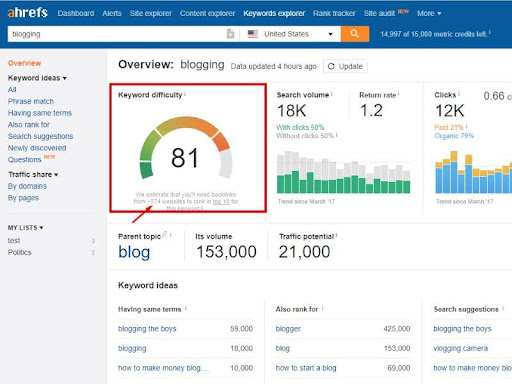
Prioritizing SEO efforts based on keyword difficulty leads to a greater ranking potential customers
Understanding keyword difficulty is essential to building an effective SEO strategy. Here’s a deeper explanation of why keyword difficulty is crucial for SEO success:
Finding the Right Keywords for Content Strategy
Keyword difficulty guides you in selecting keywords that align with your content. Selecting highly competitive keywords can lead to lost time and effort. For example, targeting a keyword like "SEO" with a high difficulty score might be unrealistic for a new website. Instead, targeting more specific long-tail keywords like "how to improve SEO for small businesses" can be a better choice.
Prioritizing Keywords in Your Editorial Calendar
Having the difficulty level allows you to arrange and prioritize keywords. If you’re a beginner, it’s wise to target lower-difficulty keywords first, gradually progressing to more competitive ones as your authority grows.
Targeting Off-Topic Keywords
Keywords with low difficulty might be easier to rank for, but they should be relevant to your content. For instance, targeting keywords like "best SEO practices for e-commerce" can be an easy win without hurting your site’s relevance or brand image.
Backlink Strategy
Low-difficulty keywords frequently need fewer backlinks to rank. However, high-difficulty keywords need more backlinks and higher domain authority to compete effectively. For instance, a keyword like "best SEO tools" may require building quality backlinks from authoritative sites before you can rank on the first page of Google.
Maintaining a Keyword Mix
Focusing only on low-difficulty keywords might make your site appear "unnatural" or overly optimized for search engines, which Google doesn’t favor. It’s important to maintain a balance of competitive and less competitive keywords. For example, targeting a combination of both long-tail keywords (with low difficulty) and high-difficulty keywords ensures that your content strategy stays balanced and natural.
How to Check Ahrefs Keyword Difficulty Score?
Checking the Ahrefs Keyword Difficulty (KD) score is easy and can help you assess how tough it will be to rank for a specific keyword. Here's how you can check it in just four simple steps:
Step 1. Go to the Ahrefs Keyword Checker
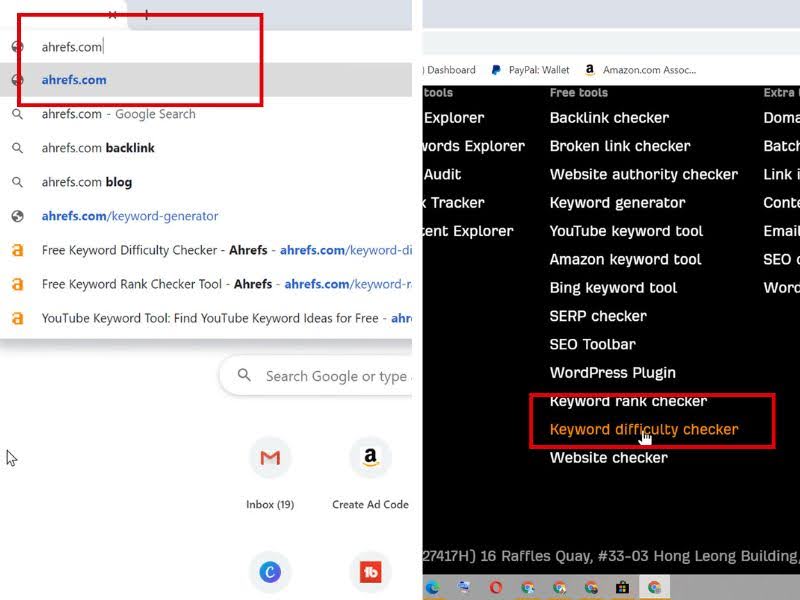
Log in and access to Ahrefs Keyword Checker Tool
Visit the Ahrefs Keyword Checker tool, which allows you to check the difficulty score for any keyword. This tool is available for free.
Step 2. Enter Your Keyword
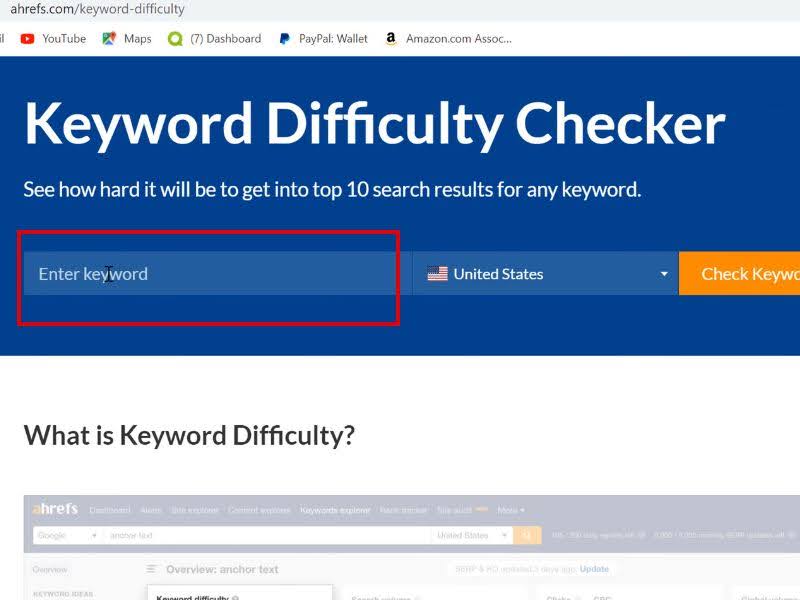
To check Ahrefs keyword difficulty score, simply enter your keyword
Type the keyword you want to analyze into the search bar. This can be any word or phrase you're considering for your SEO strategy.
Step 3. Select Your Location
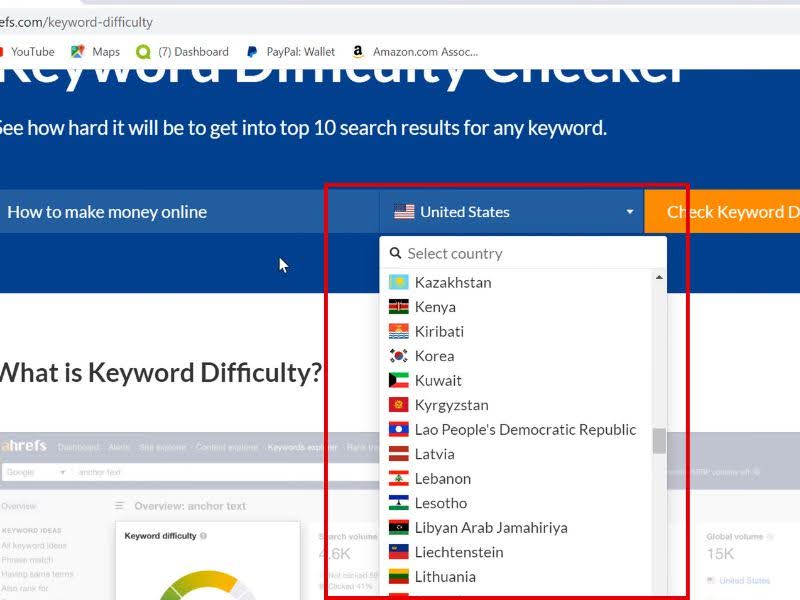
Select your location to check the keyword difficulty score
Choose the location you want to target. The keyword difficulty can vary based on geographic region, so this helps tailor the results to your specific market.
Step 4. Click "Check Keyword
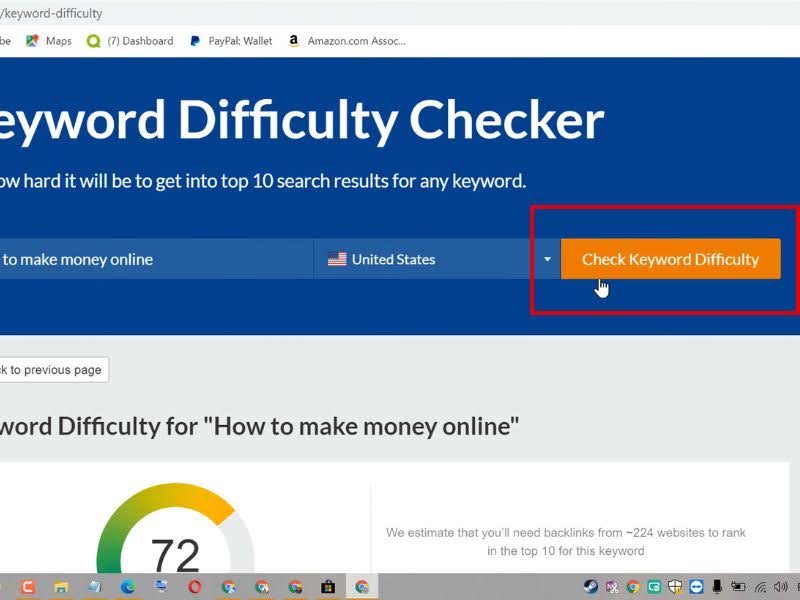
Click "Check Keyword" to get the difficulty rating
Click the "Check Keyword" button once you've chosen the area and entered your keyword. You may view the difficulty score using Ahrefs. This is determined by how many referring domains must appear on the first page of search results.
The free tool provides restricted access to Ahrefs' keyword checker, which requires you to manually enter a keyword to determine its difficulty.
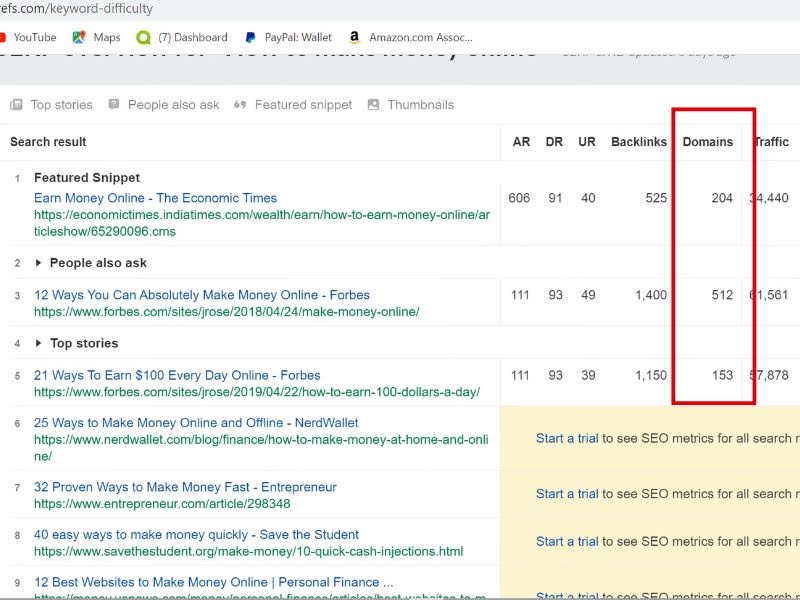
The free utility provides restricted access to Ahref's keyword checker
The paid version can unlock all the features of the keyword difficulty checker tool, offering a full range of useful options. However, you can still access these premium features at an affordable price through our Ahrefs Group Buy, making it an excellent option for budget-conscious users.

Paid members can unlock all the features of the keyword difficulty checker tool
To check Ahrefs Keyword Difficulty Score, watch the video below. It shows how to navigate Ahrefs’ tools and interpret difficulty scores for effective SEO planning.
Integrate Ahrefs Keyword Difficulty with other Ahrefs tools
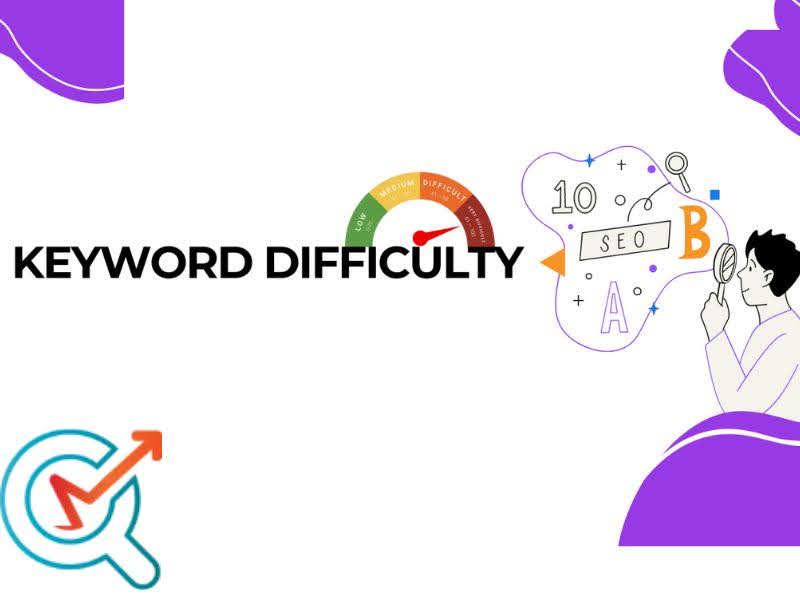
Integrate Ahrefs Keyword Difficulty with tools for smarter SEO decisions
Ahrefs integrates the Keyword Difficulty (KD) metric across all of its tools to make it easier for you to plan and improve your SEO strategy. Here’s how it works across various Ahrefs tools:
Keywords Explorer: This is where you’ll find the Keyword Difficulty Checker front and center. It helps you decide which keywords are worth targeting by showing how competitive they are. For example, when you're searching for a keyword like “content marketing strategies,” the KD score will tell you if it's too tough to rank for, so you can choose keywords with lower competition.
Site Explorer: In this tool, you can see which keywords bring traffic to your competitors’ websites. By using the KD score, you can evaluate whether you can realistically rank for those same keywords.
Content Explorer: For any topic, this tool assists you in locating the most popular articles. It also shows you which keywords those pages rank for, along with their Keyword Difficulty scores.
Rank Tracker: The Rank Tracker monitors your keyword rankings over time. It updates the KD score regularly to reflect changes in competition, so you can track your progress accurately. For example, if your website is slowly ranking for a keyword with moderate KD, you’ll know your SEO efforts are paying off.
Alternatives SEO tools Providing KD scores
If you’re looking for alternatives to popular SEO tools, the 2 options below offer keyword difficulty (KD) scores!
SEMrush
Semrush is a great alternative to Ahrefs for those looking to analyze keywords. It measures keyword difficulty with a percentage (KD%) that ranges from 0 to 100. Semrush provides a comprehensive overview of each keyword, featuring insights on intent, trends, search volume, and even SERP analysis, making it more user-friendly than Ahrefs.
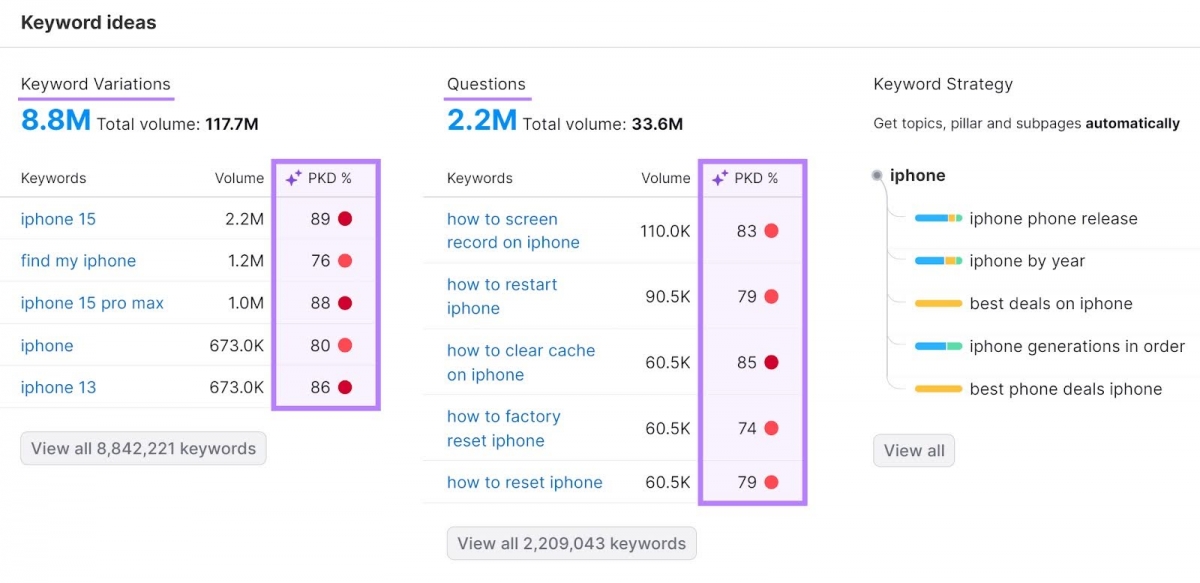
Keyword Difficulty score of SEMrush
However, unlike Ahrefs, Semrush doesn’t offer unlimited free access; you can do a limited number of searches for free each month, but full access requires a subscription. If you're interested, check out SEMrush Group Buy for a cost-effective way to access all its features!
Moz
If you're looking for alternatives to Ahrefs, Moz is a great option for checking keyword difficulty. It rates difficulty on a scale from 1 to 100 and offers a free keyword difficulty checker. Simply enter your keyword and click "Analyze Keyword" to receive a difficulty score, along with insights like monthly search volume, organic click-through rates (CTR), SERP analysis, and even keyword suggestions to help you optimize your strategy.
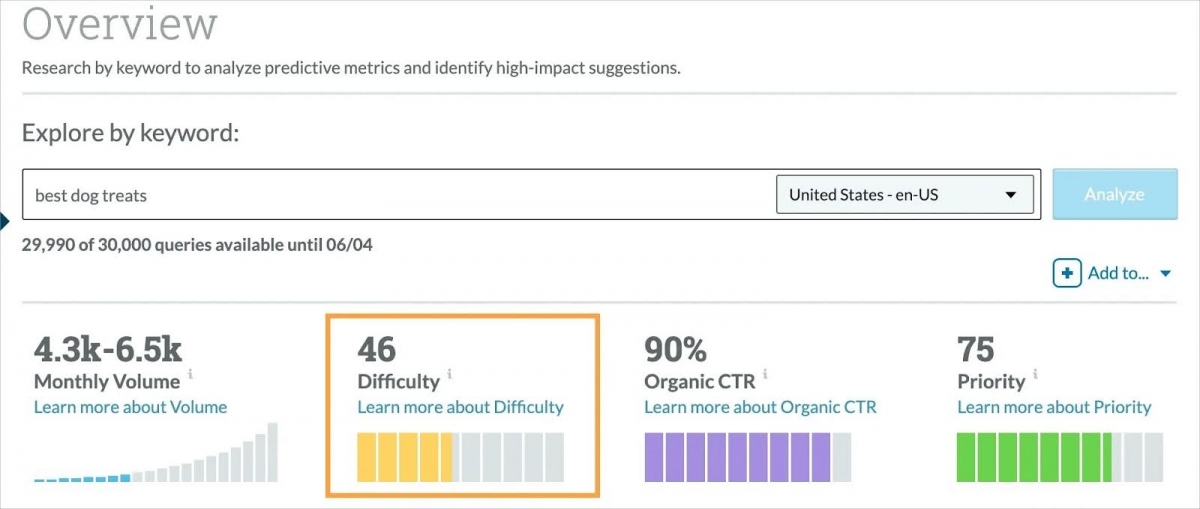
Keyword difficulty score of Moz
Discover the benefits of a Moz Group Buy to access all these powerful tools and enhance your SEO game today!
Conclusion
In conclusion, the Ahrefs keyword difficulty score is a helpful tool for anyone looking to improve their SEO strategy. It gives you an idea of how tough it will be to rank for specific keywords, allowing you to choose terms that match your site’s strengths. Understanding this score can make your content efforts more effective and targeted.


